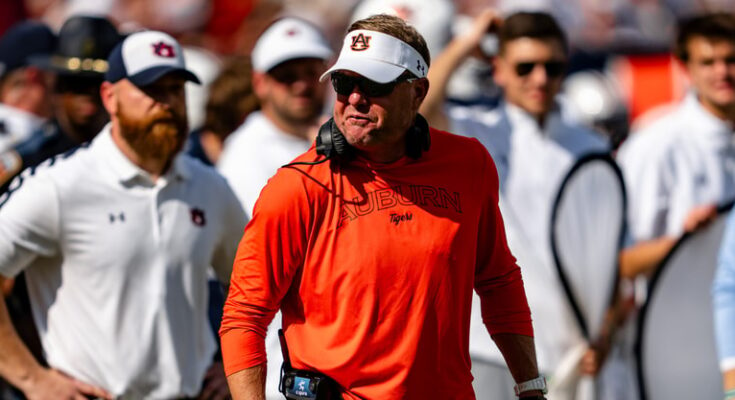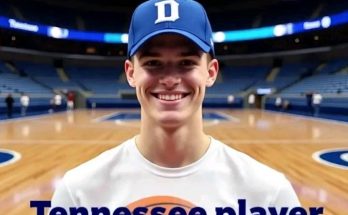The Tigers’ Course Will Be Determined by Hugh Freeze’s Third Year at Auburn, Which Will Also Reveal the Real Nature of His Coaching Legacy
When Auburn University made the bold decision to hire Hugh Freeze as their head football coach, expectations were sky-high. Freeze, a coach with a reputation for offensive innovation and revitalizing struggling programs, was brought in to restore the Tigers’ football prominence in the fiercely competitive Southeastern Conference (SEC). Yet, as with many coaching hires, the real test is never the initial fanfare or a strong start—it is the ability to build sustained success, develop talent, and create a culture that endures. For Auburn, the true measure of Freeze’s impact will be crystallized in his third season at the helm. This pivotal year will not only determine the immediate trajectory of the Tigers’ program but also reveal the authentic nature of Hugh Freeze as a leader, strategist, and architect of Auburn football’s future.
To understand why the third year is so critical, it is important to consider the context surrounding Freeze’s arrival and Auburn’s recent history. Auburn football is steeped in tradition, with a passionate fanbase, a storied rivalry with Alabama, and a history of national championships and Heisman winners. However, in the years leading up to Freeze’s hiring, the program had become mired in mediocrity, inconsistent recruiting, and coaching instability.
Freeze came in promising to restore Auburn’s competitive edge by infusing the program with a dynamic offense and a culture of accountability. His first two seasons showed flashes of brilliance — moments of exhilarating offensive fireworks, hard-fought wins against tough opponents, and glimpses of a team capable of competing at the highest levels of college football. However, there were also signs of unevenness: defensive lapses, issues with depth, and questions about his ability to manage the entire program beyond X’s and O’s.
The third season is often referred to as a “make or break” year in college football coaching. By then, a coach’s recruits populate the roster; their systems are fully installed; their culture is either taking hold or unraveling. For Freeze, the third year at Auburn represents more than just another season — it is the defining moment when the program’s true trajectory will emerge and when his real coaching identity will be put under a microscope.
In college football, the third year of a coaching tenure is widely recognized as a pivotal milestone. The reasons are manifold:
- Recruiting Cycle Completion: By year three, a coach has typically had at least two full recruiting cycles to shape the roster with players who fit their philosophy. The initial inherited players have matured or graduated, and the team begins to look like the coach’s vision on the field.
- System Familiarity: Players and staff have had ample time to learn and internalize offensive and defensive schemes. The learning curve and early mistakes of year one and two should give way to more polished, efficient execution.
- Cultural Establishment: A coach’s leadership style, expectations, and standards are embedded into the program’s daily operations, locker room culture, and team identity. The third year exposes whether a positive, winning culture is firmly rooted or if old habits and dysfunctions persist.
- Pressure and Expectations: By the third year, fans, boosters, and administrators expect tangible results — winning records, bowl appearances, or contention within the conference. Patience runs thin if progress stalls.
For Hugh Freeze at Auburn, these dynamics carry extra weight because the SEC is arguably the most competitive conference in college football. Success is not just about winning but dominating elite opponents, competing for conference titles, and returning Auburn to national prominence.
Freeze’s third year at Auburn will serve as a litmus test for several key aspects of his coaching profile:
One of the criticisms that Freeze faced early in his Auburn tenure was that his teams displayed offensive prowess but struggled defensively and lacked depth. The third year will reveal whether Freeze can recruit, develop, and integrate talent across all phases of the game, creating a balanced, resilient team capable of withstanding the brutal SEC grind.
Auburn fans will scrutinize whether Freeze has recruited strong defensive players and installed a defensive scheme that can keep pace with the league’s top offenses. Equally, his ability to develop special teams and build depth to avoid the pitfalls of injuries and fatigue will be telling.
If the Tigers emerge as a well-rounded team rather than a one-dimensional offense, it will confirm Freeze’s growth as a program architect and not just an offensive specialist.
Freeze is known for his offensive innovation, often employing spread concepts and creative play-calling. However, success in the SEC requires more than just offensive ingenuity — it demands strategic flexibility, in-game adjustments, and astute game management, especially against elite coaches who exploit any rigidity.
The third year will reveal if Freeze can adapt his game plan based on opponent strengths and weaknesses and make decisive adjustments under pressure. Will he be a coach who learns from early mistakes or one who repeats patterns to the team’s detriment?
This season’s outcomes in close games, particularly against top conference rivals, will illuminate Freeze’s real tactical acumen.
The culture of a football program often distinguishes contenders from pretenders. Freeze’s third year will show whether his leadership style has created a cohesive, motivated, and disciplined team that embodies Auburn’s values.
Off the field, Freeze’s reputation has been shaped by his personal journey, including previous controversies and redemption efforts. His ability to build trust with players, staff, and the Auburn community will be critical.
Signs of strong leadership will be evident in how players respond to adversity, maintain focus throughout the season, and represent the program in both victory and defeat.
Recruiting is the lifeblood of college football, and Auburn’s ability to attract top talent is crucial. By the third year, Freeze’s recruiting classes should start to make a measurable impact on the field.
The quality and depth of Auburn’s roster in year three will reveal if Freeze’s recruiting approach aligns with the demands of SEC competition. This includes his ability to secure elite offensive skill players, dominant linemen, and versatile defensive athletes.
Moreover, it will reflect his ability to build relationships with high school coaches and recruits, a key factor in sustained success.
The Auburn football environment is famously intense. Fans expect wins, players expect development, and the media scrutinizes every decision. The third year will test Freeze’s ability to handle pressure and maintain composure amid mounting expectations.
How Freeze responds to criticism, manages media narratives, and rallies his team will reveal his emotional intelligence and resilience.
Success in this environment often hinges on a coach’s mental toughness as much as X’s and O’s.
Auburn’s trajectory under Hugh Freeze will become clearer by the end of his third season. Several possible scenarios could unfold:
- Scenario 1: Breakthrough Success
If Auburn shows marked improvement — a winning record, a competitive standing in the SEC West, and perhaps a marquee bowl appearance — it will validate Freeze’s hire and establish a foundation for long-term success. The Tigers’ course would be on an upward trajectory, signaling that Freeze has built a sustainable program with a clear identity. - Scenario 2: Mediocre Plateau
If the team remains inconsistent, struggles to beat top opponents, and fails to produce notable improvement, questions about Freeze’s ability to elevate Auburn will intensify. The third year could mark the beginning of dwindling support, with the program stuck in limbo, unsure of its future direction. - Scenario 3: Regression and Crisis
If Auburn regresses, suffers blowout losses, or internal issues arise, it could lead to calls for a coaching change. The third year might reveal fundamental flaws in Freeze’s approach or leadership that require a reset.
Each of these outcomes will significantly shape Auburn’s football culture, recruiting prospects, and national reputation.
Looking at other coaching tenures at Auburn and in the SEC provides valuable context for Freeze’s third year. Coaches like Gus Malzahn and Gene Chizik had mixed third seasons that defined their legacies, either cementing their place or hastening their departure. Similarly, successful coaches like Nick Saban and Dabo Swinney showed clear upward trajectories by year three, highlighting the importance of this milestone.
The Tigers’ history shows that fans and administration often demand visible progress by the third season, underscoring the importance of Freeze’s performance.
Hugh Freeze’s third year at Auburn represents a critical juncture not only for the Tigers’ football program but also for his own coaching legacy. This season will lay bare the real nature of his abilities as a recruiter, strategist, leader, and culture builder. It will show whether he can transform Auburn from a program in search of identity into an SEC powerhouse once again.
For Auburn fans, players, and stakeholders, the third year will provide clarity on what Freeze truly represents: Is he a visionary capable of restoring Auburn’s glory, or a transient figure who falls short of expectations? The Tigers’ course is on the line, and Hugh Freeze’s third season will reveal the answer.
Would you like me to tailor this into a specific tone or format, like an analytical article, feature essay, or opinion piece?



